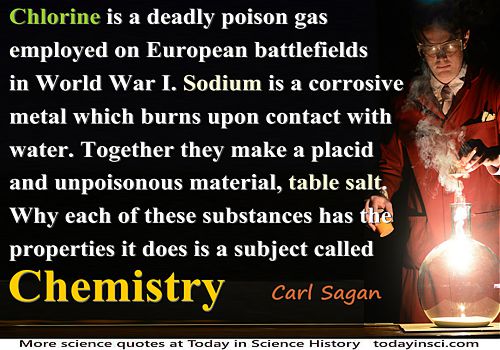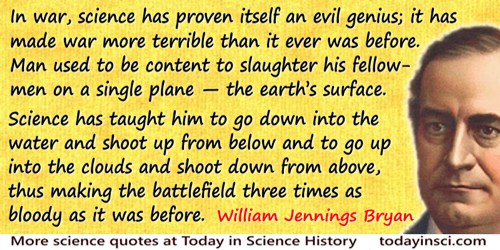Battlefield Quotes (9 quotes)
Away from their laboratories, physicist and chemist are but disarmed soldiers on a battlefield.
Hors de leurs laboratoires, le physicien et le chimiste sont des soldats sans armes sur le champ de bataille.
Hors de leurs laboratoires, le physicien et le chimiste sont des soldats sans armes sur le champ de bataille.
In article 'The Budget of Science', Revue des Cours Scientifiques (1 Feb 1868) and published as a pamphlet, Some Reflections on Science in France. Original French quote in René Vallery-Radot, La Vie de Pasteur (1900), 215. As translated in René Vallery-Radot and Mrs R. L. Devonshire (trans.) The Life of Pasteur (1902), 199. Also translated as “Outside their laboratories, the physicist and chemist are soldiers without arms on the field of battle.”
Chlorine is a deadly poison gas employed on European battlefields in World War I. Sodium is a corrosive metal which burns upon contact with water. Together they make a placid and unpoisonous material, table salt. Why each of these substances has the properties it does is a subject called chemistry.
In Broca's Brain: The Romance of Science (1979), 18, footnote.
History … celebrates the battlefields that kill us, but keeps silent on the crop fields that sustain us. It knows the bastards of kings, it doesn’t know the origin of wheat. This is the way of human folly.
From the original French, “L’histoire … célèbre les champs de bataille qui nous tuent, elle garde le silence sur les champs de culture qui nous font vivre; elle sait les bâtards des rois, elle ne sait pas l'origine du froment. Ainsi le veut la sottise humaine,” in Les Merveilles de l'Instinct Chez les Insectes: Morceaux Choisis (The Wonders of Instinct in Insects: Selected Pieces) (1913), 242. English version by Webmaster using Google to translate literally and indicate the context is lamenting that history has not preserved the origins of food cultivation. The translation usually seen is “History celebrates the battlefields whereon we meet our death but scorns to speak of the ploughed fields whereby we live. It knows the names of the kings’ bastards, but cannot tell us the origin of wheat,” for example, in Alan L. Mackay, A Dictionary of Scientific Quotations (1991), 88.
In war, science has proven itself an evil genius; it has made war more terrible than it ever was before. Man used to be content to slaughter his fellowmen on a single plane—the earth’s surface. Science has taught him to go down into the water and shoot up from below and to go up into the clouds and shoot down from above, thus making the battlefield three times as bloody as it was before; but science does not teach brotherly love. Science has made war so hellish that civilization was about to commit suicide; and now we are told that newly discovered instruments of destruction will make the cruelties of the late war seem trivial in comparison with the cruelties of wars that may come in the future.
Proposed summation written for the Scopes Monkey Trial (1925), in Genevieve Forbes Herrick and John Origen Herrick, The Life of William Jennings Bryan (1925), 405. This speech was prepared for delivery at the trial, but was never heard there, as both sides mutually agreed to forego arguments to the jury.
Perhaps I occasionally sought to give, or inadvertently gave, to the student a sense of battle on the intellectual battlefield. If all you do is to give them a faultless and complete and uninhabited architectural masterpiece, then you do not help them to become builders of their own.
National Academy of Sciences, Biographical Memoirs Vol. 66 (1995), 86-87.
The century after the Civil War was to be an Age of Revolution—of countless, little-noticed revolutions, which occurred not in the halls of legislatures or on battlefields or on the barricades but in homes and farms and factories and schools and stores, across the landscape and in the air—so little noticed because they came so swiftly, because they touched Americans everywhere and every day. Not merely the continent but human experience itself, the very meaning of community, of time and space, of present and future, was being revised again and again, a new democratic world was being invented and was being discovered by Americans wherever they lived.
In The Americans: The Democratic Experience (1973, 1974), ix.
Two contrary laws seem to be wrestling with each other nowadays: the one, a law of blood and of death, ever imagining new means of destruction and forcing nations to be constantly ready for the battlefield—the other, a law of peace, work and health, ever evolving new means for delivering man from he scourges which beset him. The one seeks violent conquests, the other the relief of humanity. The latter places one human life above any victory: while the former would sacrifice hundreds and thousands of lives to the ambition of one.
Address at the Inauguration of the Pasteur Institute. In René Vallery-Radot, The Life of Pasteur, translated by Mrs. R. L. Devonshire (1919), 444.
We will be misguided in our intentions if we point at one single thing and say that it will prevent war, unless, of course, that thing happens to be the will, the determination, and the resolve of people everywhere that nations will never again clash on the battlefield.
Opening address (7 Nov 1945) of Town Hall’s annual lecture series, as quoted in 'Gen. Groves Warns on Atom ‘Suicide’', New York Times (8 Nov 1945), 4. (Just three months before he spoke, two atom bombs dropped on Japan in Aug 1945 effectively ended WW II.)
While religion prescribes brotherly love in the relations among the individuals and groups, the actual spectacle more resembles a battlefield than an orchestra. Everywhere, in economic as well as in political life, the guiding principle is one of ruthless striving for success at the expense of one’s fellow men. This competitive spirit prevails even in school and, destroying all feelings of human fraternity and cooperation, conceives of achievement not as derived from the love for productive and thoughtful work, but as springing from personal ambition and fear of rejection.
…...


 In science it often happens that scientists say, 'You know that's a really good argument; my position is mistaken,' and then they would actually change their minds and you never hear that old view from them again. They really do it. It doesn't happen as often as it should, because scientists are human and change is sometimes painful. But it happens every day. I cannot recall the last time something like that happened in politics or religion.
(1987) --
In science it often happens that scientists say, 'You know that's a really good argument; my position is mistaken,' and then they would actually change their minds and you never hear that old view from them again. They really do it. It doesn't happen as often as it should, because scientists are human and change is sometimes painful. But it happens every day. I cannot recall the last time something like that happened in politics or religion.
(1987) -- 


